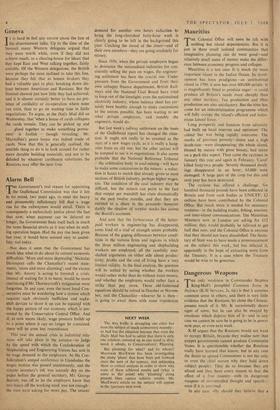Alarm Bell
Tm: Government's real reason for appointing the Guillebaud Commission was that it felt in no mood, two years ago, to meet the heavy and presumably inflationary bill that a wage rise for the railwaymen would entail. There is consequently a melancholy justice about the fact that now, when payment can be delayed no longer, the Government finds itself back in much the same financial straits as it was when its stall- ing operation began. Had the pay rise been given last year, it would have seemed easy to assimi- late; not today.
Nor does it seem that the Government has much idea what to do about its current economic difficulties. 'More and more depressing,' Nicholas Davenport calls the Chancellor's recent state- ments, 'more and more alarming'; and the excuse that Mr. Amory is acting to forestall a crisis, instead of waiting for it to burst, would be more convincingif Mr. Thorneycroft's resignation were forgotten. In any case, even the most loyal Con- servative must be wondering how a system which requires such obviously inefficient and make- shift devices to shore it up can be equated with the happy picture of our economy which is pre- sented by the Conservative Central Office. And if, as now seems likely, wage pressure builds up to a point where it can no longer be contained, there will be even less resemblance.
This year the annual crisis in industrial rela- tions will take place in the autumn—to judge by the speed with which the Confederation of Shipbuilding and Engineering Unions has sent in its wage demand to the employers. At the Con- federation's annual conference in Llandudno the wages motion was passed unanimously, and the minute secretary's ink was scarcely dry on the paper before the general secretary, Mr. George Barratt, was off to let the employers know that two hours off the working week was not enough: the men were asking for more pay. The unions' demand for another two hours reduction to bring the long-cherished forty-hour week is clearly going to be left in the background this year. Catching the mood of the times—and of their own members—they are going resolutely for money.
Since 1956, when the private employers began to denounce the nationalised industries for con- sistently selling the pass on wages, the engineer- ing settlement has been the crucial one. Under pressure from the Government and from their own unhappy finance departments, British Rail- ways and the National' Coal Board have tried to keep out of the limelight; even the nationalised electricity industry, whose balance sheet has cer- tainly been healthy enough to make concessions to the unions possible, has been waiting to see what private employers, and notably the engineers, would do.
But last week's railway settlement on the basis of the Guillebaud report has changed the situa- tion. It ought not really to be counted as the start of a new wages cycle, as it is really a hang- over from an old one; but the other unions will be tempted to use it in negotiations. It also seems probable that the National Reference Tribunal -the arbitration body in coal-mining—will have to make some concessions to the miners: a reduc- tion in hours to match that already given to most sections of British industry, perhaps higher wages, too. The condition of the coal industry may be difficult, but the miners can point to the fact that output per manshift has risen dramatically in the past twelve months, and that they are entitled to a share in the proceeds--however darkly the shadow of surplus stocks lies across the Board's accounts.
And now that the forbearance of the better- paid workers in engineering has disappeared, some kind of a trial of strength seems probable. Because of the gaping differences between condi- tions in the various firms and regions in which the three million engineering and shipbuilding workers are employed, all the carefully mar- shalled arguments on either side about produc- tivity, profits and the cost of living have a very limited validity. In the final analysis, the question will be settled by seeing whether the workers would rather strike than do without more money, and whether the employers would rather face a strike than pay more. These old-fashioned equations should be solved in October or Novem- ber, and the Chancellor—whoever he is then— is going to await them with some trepidation.


























































 Previous page
Previous page